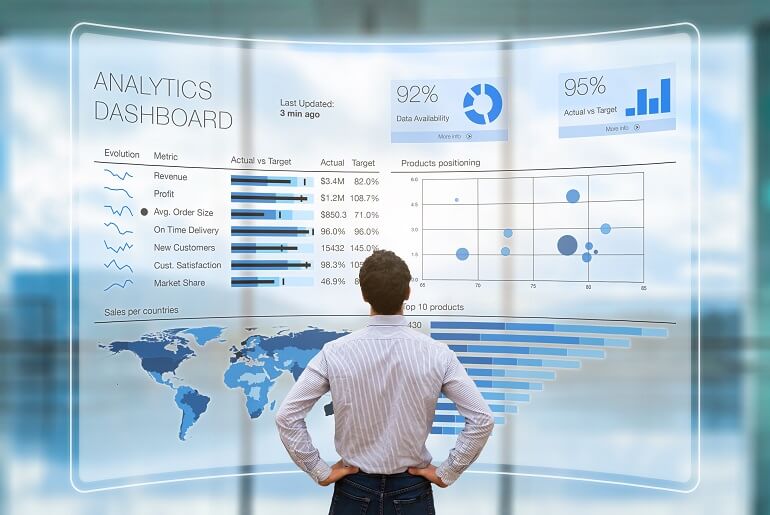Table of Contents
Dynamics Business intelligence plays a very important role within the organization to run a profitable business. Business intelligence is the set of processes, technologies and methods that facilitate the organizations to convert the new raw data into the meaningful substantive date that permits the organizations to develop profitable business actions. Business intelligence and analytics is very important aspect of business in successful organizations. Business intelligence and analytics implements the data management solutions and enables the organizations and enterprises to gather the historical and present data of their organizations and then use the statistical software’s and solutions to analyze the raw information for the better future decisions. Business intelligence and analytics solution by folio3 microsoft dynamics partner provide insightful information about the business operations of the enterprise and help them to make an efficient business decision.
Business Intelligence and Data Analytics – Brief Discussion
Business intelligence and data analytics drives profitable business actions and optimize the overall processes of the business system. Business intelligence is the set of computer code and services that develop profitable business actions and provide the intelligence and knowledge to run the business processes within the profitable means. It is a way to transform and remodel the information into actionable insights that drive profitable business decisions.
Data analytics is the technique of analyzing the raw data that develops the conclusion regarding the information of that raw data. Data analytics optimize the business methods and help extend the efficiency and potency of the overall business process or system. Data analytics is the intersection of the data, statistics and the business. Therefore, the combination or mixture of these fields helps the business and organizations to succeed. The primary goal of data analytics is to extend the efficiency and potency of the business system by discovering the patterns of data. Business intelligence and data analytics are the two key aspects of the organization. Business intelligence and data analytics drives profitable business actions and optimize the overall processes of the business system. Data analytics are the algorithms that verify the link between information insights. The most distinct difference between the business intelligence and the data analytics is that the business intelligence helps to select about business processes and business actions while data analysis predicts the conclusions supported on the analysis of the data. The other difference between the business intelligence and the data analytics is that the business intelligence selects data to help make decisions about the business operations while the data analytics requires high mathematical expertise to fetch the data patterns that provide the insight about the business data. Business intelligence requires the data used and worked by the business managers to run the business operations. If the employees of the organizations are using visualization tools, such as Tableau, Microsoft Power BI, Looker, or any of a host of other options, they could create their own BI reports.
Data analytics demand a higher level of mathematical experience and expertise. Data scientists take massive sets of data and apply algorithms to prepare and model them to the point where the information can often be used for innovative, predictive reports. It depends on algorithms, simulations, and quantitative analysis to determine relationships between data and insights. Business intelligence is that method of addressing the continuing operations serving the organizations and departments to meet the organizational business goals and helps them to make decisions to run their business within a profitable manner. Data analytics will help facilitate firms that wish to remodel the way they do business. In each of the disciplines, the data preparation and data utilization is the key element to run each operation effectively therefore, these are the significant differences between the business intelligence and business analytics.
- We will figure out that which of the products was most successful in the past (BI)
- Which are the seasonal trends that makes the influence on the sales of the past launches. (BI)
- What are the reasons that the customers bought the past successful products?
For example, assuming that the hypothetical e-commerce store sold boutique women’s fashion. In that case, the user will have to work on the retail analysis of that store to generate the business for the profitable actions so in order to develop the business intelligence first, the user would examine which of the clothing categories are gaining the profit and which of the products are making it to the favorites and bought frequently by customers. Then, users can examine the number of times in the year those in-demand products had been launched. Finally, the last step of the business intelligence is that the users would be able to develop the customer insights as to why their customers like the particular products? How the products are unique or different from competitors? What are the factors that attract the customers to buy those particular products? In that way by using business intelligence techniques users can generate the profitable actions to run successful businesses.
What is Business Analytics and Business Intelligence Solutions?
Business intelligence and the business analysis play an essential role in the process of decision-making. Business analysis and business intelligence support the decision making process in various ways and help the organization make decisions promising maximum profits. Business intelligence (BI) and business analytics (BA) are responsible in delivering the precise, correct and efficient information to the decision makers, and various other data analysis tools aid to provide clarity in understanding the updated data trends therefore, assist in decisive actions. Business intelligence has proven to be extremely significant in the decision making process of organizations because the business intelligence ensures that the transmitted information should be appropriate and precise. Data and information should be based on the real time analysis to assist in better understanding and management of date that has been collected.
Dont forget to Read our detailed guide on Microsoft Dynamics vs Sales force
A Business Intelligence environment contains the data from the business environment including, the BI infrastructure, a BI toolset, management user guides and methods, a BI delivery platform, or executive support systems [ESS]), and the user interface. Business intelligence uses these six essential analytical functionalities to deliver to achieve these ends:
- Predefined production reports
- Parameter-driven reports
- Dashboards and scorecards
- Advertisement hoc queries and searches
- The ability to drill down and the ability to develop scenarios and model forecasts.
So these are the business intelligence techniques that help in the decision making of a particular organization. Business intelligence and business analytics are the most vital pieces of any association or organization to maintain a profitable and beneficial business since business intelligence consistently drive the profitable business actions.
The main use of business intelligence is that it helps the specialty business units, administrators, top executives and other operational workers to take the right and appropriate decisions dependent on the precise business information. It will ultimately help the business owners and entrepreneurs to generate new opportunities for their business to expand in the market and to recognize inefficient processes that need to focus in building up the business activities.
BI uses the AI algorithms and calculations that brought the right and valuable business information from the organization’s data and build up the noteworthy insight that helps the association chiefs to take the right and compelling key decisions. BI clients can investigate and introduce data in the form of business intelligence reports, charts and dashboards that help the stake holders and managers to envision the complex information in appropriate format which will ultimately help the business owners and decision makers to develop new opportunities for their business to expand in the market and to distinguish inefficient processes that need to focus in developing the business operations.
Business analysts generally involve in ordering, arranging, processing, and analyzing the business information, and utilizing statistical analysis and iterative models to transform the data into business insights.
Business analysts determine which of the datasets are essential and how they can be utilized to solve the complex business issues and helps organizations improve their efficiency and productivity which resultantly increment the revenue of the organization or association. The primary difference between the business intelligence and the data analytics is that the business intelligence aids in make decisions about business procedures and business activities while data analysis foresees the conclusions based on the analysis of the data. Another difference between the business intelligence and the data analytics is that, business intelligence utilizes information to help make decisions regarding business operations while the data analytics requires high mathematical expertise and skill to fetch data patterns that provide the insight and understanding about the business data.
Business Intelligence And Analytics – Industries and Use Cases
Presenting a case that illustrates the difference between business intelligence and business analytics.
Assume that you are working for a marketing firm that uses both business intelligence and analytics to help large e-commerce companies launch new products. In order to understand what new products would be most likely to succeed (analytics), you would need to figure out:
- Which products are successful in the past? (This is Business intelligence)
- What are the seasonal trends that makes the impact on the success of that past launch? (This is Business intelligence)
- What are the factors that urges customers to buy that past successful product? (This is Business intelligence)
Assume that you are working in the boutique store and you are asked to work on the retails analysis of the store then you will first determine that what clothing categories drive the most profit and in what time of the year that these clothing categories generate huge profit and why customers like those pieces of clothing category than any other
Business intelligence plays a significant role in the organization to maintain the profitable and productive business. Business intelligence is the arrangement of procedures, technologies and strategies that help the organizations to convert the raw data into the significant data that helps the organizations to develop the profitable and productive business actions. Business intelligence is the set of software and services that develops the actionable intelligence and knowledge to run the business processes in the profitable way. Business intelligence is the way to transform the data into actionable insights that drives the profitable business decisions. Business analytics is the iterative process which emphasis on the statistical analysis of the data. Business analytics includes the ordering, arranging, preparing and analyzing the business data, and using statistical analysis and iterative models to transform the data into business insights. In business analytics, we confirm what of the datasets are valuable and how they can be utilized to take care of the unpredictable business issues and trends associations to upgrade their effectiveness and profitability which resultantly increment the income of the organization. The objective of business examination is to figure out which datasets are valuable and how they can be utilized to take care of issues and increment effectiveness, profitability, and income.
Business analytics is the iterative procedure which emphasis on the statistical analysis of the data. Business analytics includes ordering, arranging, processing and analyzing the business data, and using statistical analysis and iterative models to transform the data or information into business insights. In business analytics users determine which datasets are valuable and how they can be utilized to solve the complex business problems and tends organizations to enhance their efficiency and productivity which resultantly increase the revenue of the organization. The objective of business analytics is to determine which datasets are essential and how they can be leveraged to tackle problems and increase efficiency, productivity, and revenue.
Business Intelligence Solutions
Business intelligence solutions are the solutions that enable enterprises to implement the collective process of studying and analyzing the business data and use the business intelligence and other statistical software that illustrates the useful information about the business operations. Business intelligence solutions are the set of methodologies that determines which datasets are useful and how these datasets can be proved efficient to solve problems and increase the efficiency, profit and productively of the organizations.
Following are the key solutions of business intelligence:
Artificial Intelligence:
AI and machine learning are the advancing technologies that can be utilized in the business intelligence as well. These advancements help the organizations to manage real-time data analysis and dashboard reporting to see the data trends and the data patterns that can be utilized in business intelligence to drive the profitable business activities.
Collaborative BI:
These are business intelligence software combined with collaboration tools, including social media, and other recent technological advancements to enhance and upgrade working together and sharing by groups of data and information for collaborative decision-making and communitarian dynamics.
Embedded BI:
This incorporates the integration and advancement of BI software or its capabilities into another business application to enhance the capabilities of the business intelligence and reporting. Capabilities generally explicit to BI software are embedded or installed into another non-BI application thereby streamlining data collection and analyses.
Following are the top business intelligence solutions:
- Sisense
- Looker
- Domo
- Tableau
These are the business intelligence and the business analytics that provide useful insights about the organizational data and allow organizations to understand, visualize and analyze the company information.
Comparison Between Business Intelligence & Business Analytics
Business intelligence and business analytics both are the terms used to drive profitable business. Both terms interpreted and overlap each other in many areas and scenarios. Business intelligence is the methodology to analyze and understand the past and present data of the company’s business operation while Business analytics refers to interpret and analyze the enterprise data to make future decisions that drive profitable business operations. Business intelligence is the process of retrieving and interpreting the organizational data to analyze and interpret the current situation in the company’s business and how it underwent in the past and how we can improve it in the future to increase productivity and revenue. The business helps the company to make an effective decision by analyzing the present and past trends of their business operations. Business analytics is the process of retrieving and analyzing the organizational data by using different statistical tools and technologies that provides useful insights about how it will change in the future and how can it make an impact on the business operations of the company. Business analytics enables companies to develop the course of actions to achieve predictive outcomes by thoroughly analyzing the company’s business patterns and trends and allows companies to prepare for the future in a better way. Therefore, these are the key comparisons between Business intelligence and business analytics.
Business Intelligence Vs Business Analytics
| Business intelligence | Business Analytics |
| Business intelligence use the data trends to help run the business – making decisions. | Business Analytics use the data trends to help drive business change – asking questions. |
| In business intelligence, the historical analysis drives your business actions. | Business Analytics use statistical and trend analysis to explain that what is the next decision |
| In business intelligence the organizations Improves current strategy with knowledge of past results. | Business Analytics Improves strategy for moving forward with predictive analysis. |
| In business intelligence, we mark the current problems and then develop their solutions. | In business analytics, we identify the potential issues and then make ways to avoid them in the business processed. |
| Business intelligence is the set of processes, technologies and strategies that help the organizations to convert the raw data into the meaningful information that allows the organizations to develop the profitable business actions | Business analytics is the iterative process which emphasis on the statistical analysis of the data. Business analytics involves the collating, sorting, processing, and analyzing the business data, and using statistical analysis and iterative models to transform the data into business insights |
Choosing Between BI and BA for your business
There is a very clear difference between business intelligence and business analytics. Business intelligence uses the past and present data to optimize the current business operations of the organization while the business analytics interpret and analyze the past and present data to predict the future actions of the organizations. Business analytics and Business intelligence both are the very important part of any organization and both methodologies help the enterprises to drive the profitable business. The companies, which have a large amount of extensive data, should use the business software, solutions while the companies, which are new, and going to start their business operations should consider the business analytics to determine their future actions for profitable business.
Data analysts mostly liable for the analyzing the raw data that builds up to the conclusion about the information of that raw data. Data analysts enhance the business process and assist with expanding the proficiency of the overall business procedure or system. Data analysts are the intersection of the information technology, statistics, insights and the business. The combination of these fields helps the business and organizations to succeed. The essential objective of the data analytics is to expand the efficiency of the business system by finding the patterns of data. Data scientists and Business Intelligence (BI) analysts are the two different domains and each organization must have these two roles in its organization because these two roles together enhance the data that can be utilized in productive business decisions. The primary focus of the business intelligence analysts is interpreting the past data, while data scientists work on the previous data to take predictive actions for the future. Data analysts help the organization reduce the risk of any potential risk that can harm their business deals and give them valuable information about the anticipated sales by making general predictions and forecasts of future performances of the organizational products and stocks
On the other hand, the Business intelligence analysts perform analysis on past information. The emphasis on the development and improvement of the set of software and services that builds up the significant insight and information to maintain the business forms in the beneficial and profitable way. Business intelligence is the best approach to transform or change the data into actionable insights, that drive the profitable business decisions where data professionals perform. The precise and plan based work put together the small pieces of information into the noteworthy understanding that drives the beneficial choice so that both of the experts are important to keep up an organization’s financial health.
Folio3 Dynamics Offer Custom BI and BA Solution
Folio3 Dynamics Offer Custom BI and BA Solution that helps you report and make sense of your data and enables you to share insights within your team. They offer a business suite that allows organizations to integrate the huge amount of data that helps in reporting and profitable business solutions.
FAQs
How do business intelligence and business analytics support decision-making?
Business intelligence and business analytics play a key in decision-making. These techniques enable stakeholders and managers to drive profitable business actions in light of past trends and company data insights. These techniques enable the decision-makers to analyze the business information and statistical analysis of the past and present business operations to determine which actions and statistics can lead to profitable business actions. Therefore, business intelligence and business analytics play a crucial role in the profitable decision making of the company is by providing precise information about the business operations of any enterprise.
Why business intelligence and analytics is important?
Business intelligence and business analytics are very important methodologies in any organization because business intelligence and analytics provide insightful information about the business operations of the enterprise and help them to make an efficient business decision. Business intelligence plays a vital role in the success of any organization because it delivers precise, correct, and efficient information to the decision-makers and leads them to profitable business actions.
What is the difference between the data analyst and business analyst?
The key difference between the data analysts and business intelligence analysts is that the data analysts analyze the raw data that builds up to the conclusion about the information of that raw data. In contrast, the business intelligence analysts perform analysis on past information and responsible for the development and improvement of the set of software and services that builds up the significant insight and information that enables the stakeholders to make profitable business decisions.





